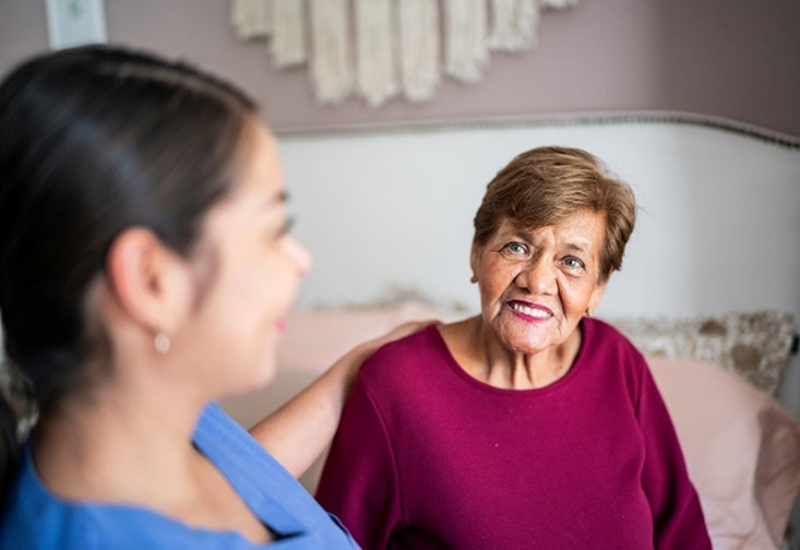The Benefits of Home Health Care
Now more than ever before, people are choosing to age in place, remaining in their homes in their later years. This is a wonderful alternative to assisted living, allowing people to remain in familiar surroundings, but it does require some planning to be a safe option. In-home care is a helpful tool, allowing older adults to stay at home safely, while giving their loved ones respite from caregiving. If there comes a time when an older person must have care around the clock, though, it can get a little bit confusing. Does your loved one need live-in home care or 24/7 home care? What is the difference between the two options? They may sound like the same thing, but in fact, there are some meaningful distinctions.
Live-In Home Care
As you would probably expect, live-in care involves someone living at the house 24 hours a day. Typically, two to three caregivers alternate shifts. Each caregiver stays for a certain number of days, 24 hours a day, and they sleep at the house. A live-in caregiver must have private sleeping quarters and must be given a break in which to sleep, as well as a break during daytime hours. Having the same caregivers alternating shifts significantly improves the consistency of care, and it helps clients build relationships with their caregivers. However, if you need coverage during the scheduled daily break, which is usually eight hours long, you will have to pay someone to cover it or do it yourself. Otherwise, your loved one will have a eight-hour gap in coverage, during which he or she will be left alone. What’s more, many people find it inconvenient to provide living quarters for the caregivers, because they simply do not have the space. Some people may also be uncomfortable with someone who is not a family member sleeping in their house. In that case, live-in-home care may not be the right option.
24/7 Home Health Care
Though it sounds the same, 24/7 home care works differently than live-in home care. With this option, coverage is provided around the clock, with a caregiver available at all times. This is often a good choice for people with dementia, who need 24-hour-a-day supervision to keep them safe and monitor them at night. With 24/7 care, two caregivers work daily, each for a 12-hour shift and two caregivers cover the night shifts. We typically assign four caregivers to a 24/7 client. Because of the shorter shifts, the caregivers do not require sleep breaks, and sleeping quarters need not be provided. The schedule of caregivers is flexible, and the family can decide how best to structure the shifts. 24-hour home care means a caregiver will be with the client at all times of day or night, and that caregiver will typically be awake and alert. If the client doesn’t necessarily need supervision all night, the family can allow the caregiver stand-by in another room. Knowing someone is there to handle any emergencies that might arise, or simply be there if the client needs help using the bathroom, is good for the family members’ peace of mind. The drawback of 24/7 care is that it tends to be significantly more expensive than live-in care. Additionally, there are slightly more caregivers involved in 24/7 care, which can be upsetting to some older people, particularly those with dementia and those for whom familiarity is a priority.
Finding the Right Care
Which care is right for your loved one and your situation? It’s a highly subjective decision, based on the specific needs of your family. Some people prefer the stability and consistency of a live-in caregiver and have both the room to allot to live-in care and the ability to cover gaps in care when the caregiver takes a break. Other families find that it works better for them to find more flexible care, even if that means several different caregivers will be coming in and out of the house. Look into the different types of care available in your area before you are faced with an emergency so that you will be prepared. It’s best to discuss the options with your family before a time of crisis arises, carefully weighing the pros and cons, so that you will all understand the available care and be able to make an informed choice about which type of care will work best for your loved one. Carefully consider your loved ones’ needs, and how much support is necessary. For some people, companionship, light housekeeping, and assistance with the activities of daily life are all that is required. Others need transportation for errands or appointments, reminders to take medication, and guidance for exercises. Still, other people need skilled nursing assistance or care specifically tailored to dementia patients. Whatever you need, you can find a viable home care option to meet those needs.
Exceptional Care with Flexibility to Meet Your Needs
When you are seeking live-in home care services for a loved one, SmithLife Homecare can help. For over 20 years, we’ve been helping families get the home health care services they need, with the exceptional quality they deserve. Throughout Rockville, MD and the surrounding areas, our private-duty Residential Service Agency provides a wide range of supportive services, tailored to meet the needs of those in our care. We are affiliated with the Charles E. Smith Life Communities and Augustine Home Health Care, which gives us the ability to provide the kind of quality care that makes our agency highly regarded. Focused on our clients’ evolving needs, we are perpetually striving to build connections in our community. Our highly qualified team of caregivers prioritizes our client’s needs, serving with compassion and an understanding of the importance of high-quality, flexible home health care. To learn more about our full suite of professional senior care services, call 301-816-5020 or contact us through our website.
Note from the author-
Thank you for reading our latest blog post at SmithLife Homecare. If our content has been helpful, please share it with others. We’re committed to providing valuable insights on homecare and well-being, with fresh content monthly. We value your feedback and suggestions; feel free to leave a comment below. Your support helps us make a difference. Stay tuned for our monthly blog posts!

About the Author-
Renan Augusto is the Director of Digital Marketing for SmithLife Homecare. SmithLife Homecare is a senior in-home care provider located in Rockville, MD & Washington, D.C. Renan has a Master of Science in Digital Marketing. He helps families with starting home care service. He holds credentials as a Certified Dementia Practitioner, Senior Home Safety Specialist, and Meta Certified Digital Marketer.
